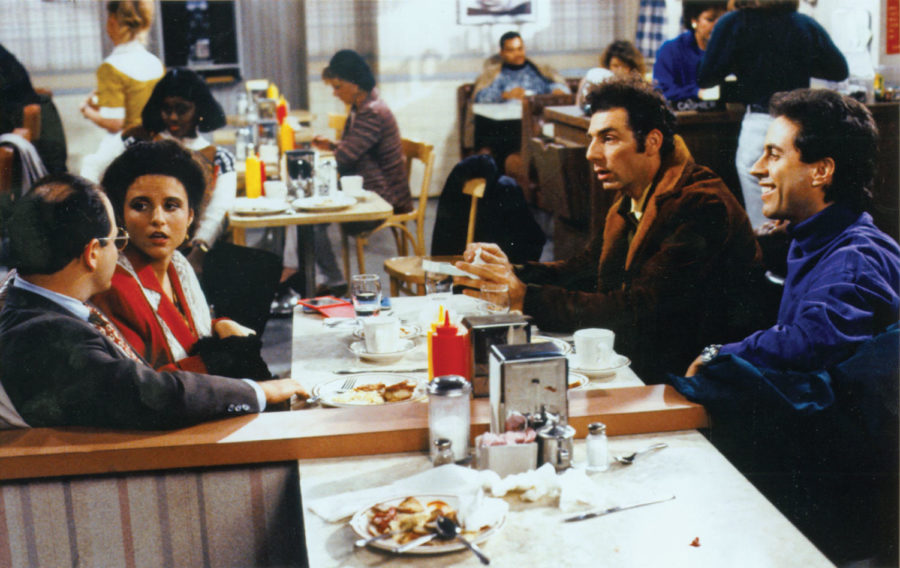“Seinfeld,” one of the greatest sitcoms of all time, is now on Netflix
Streaming recommendation of the week 10/01/21
The classic ’90s sitcom,”Seinfeld” brings its 9 seasons to Netflix’s array of TV shows and movies.
October 1, 2021
Over the past few years, Netflix, the largest streaming service in the world, has progressively lost some of their biggest, most-watched shows. Between losing “Friends,” “Parks and Recreation” and “The Office,” the streaming behemoth no longer has many of the most popular sitcoms that viewers watched on a regular basis. These shows were so valuable to Netflix that the service paid upwards of $100 million dollars just to keep “Friends” available to watch for one additional year, but increasing competition from other streaming services and an internal pivot to original prestige content has made these losses inevitable. All this has left Netflix without a “comfort-food” show, one that people could just keep in the background of their lives and watch over and over.
Until now.
Starting Oct.1, 2021, all nine seasons of “Seinfeld” will be available on Netflix after paying more than $500 million dollars to acquire the exclusive rights for five years. For those not familiar with “Seinfeld,” that may seem like an absurd amount of money for one show, but those in the know will recognize the immense potential of this deal. Simply put, “Seinfeld” is one of the greatest sitcoms of all time. It is hard to overstate the influence the show has had since its premiere in 1989 through its finale in 1998, influencing every single TV show to come out since. The only applicable comparison is to the impact The Beatles had on music, and that’s not hyperbole.
Co-written by comedians Larry David and Jerry Seinfeld, the show centers around a semi-fictional version of Jerry, who also plays himself, focusing on the daily minutiae of his life as a comedian in New York City and the frustrations that come with basic human social interaction. Jerry, along with his friends—his perpetual loser sidekick George Costanza (Jason Alexander), his ex-girlfriend Elaine Benes (Julia Louis-Dreyfus) and his hipster doofus neighbor Cosmo Kramer (Michael Richards)—are all unequivocal jerks, and that’s what makes them so appealing. After decades of sitcoms in the vein of “I Love Lucy,” “Cheers” and “All In The Family” with clear morals and a lesson learned after each episode, “Seinfeld” emphatically rejects such a paradigm. Here the show is explicitly “about nothing,” with Larry David famously saying that the mantra of the show was that there must be “no hugging and no learning.” No morals can be delivered because, in the end, all the characters are selfish and unlikable, always acting in their own interests. Whether it be Jerry’s constant dumping of girlfriends for inane reasons, George’s continuous falsehoods and deception around every aspect of his life, Elaine’s ceaseless conceitedness in every interaction or Kramer’s continual cluelessness causing faux pas, none of these characters are worth rooting for.
That’s good, because they do nothing that the audience can root for anyways. Rather than having overarching plots with evolving characters, each episode is fairly self-contained and comments on the usual aggravations of everyday life we might not notice. The cynical humor that would define sitcoms through the 2000s and 2010s originated here and is shown through the show’s superficial conflicts. Entire episodes are centered around whether one should back in or pull forward when parallel parking, the pain of waiting for a table at a restaurant or the forced social obligations we must follow when going to a dinner party. The main characters’ selfish qualities amplify each situation and cause innumerable chain reactions, often leading to interlocking story arcs and everything being tied together at the end in a disastrous fashion. This sort of structure was completely atypical to network comedies at the time and would set the basis for all future sitcoms. Can you think of any sitcom today that doesn’t have multiple storylines converging? Thank “Seinfeld” for that.
The show’s constant dialogue and conversations about inane topics, rather than plot progression, further drives home the point that the show is truly about nothing, except human nature itself. To have a show where nothing is learned and with such indifference to morals was groundbreaking, as were the sorts of topics covered during the show. With scenarios around usually taboo subjects such as masturbation, the disabled, threesomes, gay relationships and antisemitism, the show broke ground on the types of content that could be discussed on network television. So many conventions have been broken and formed around the show and television comedies have never been the same.
It is with that in mind that you should now watch “Seinfeld” on Netflix. Despite its age, it remains as fresh as ever. Though it set the standard for all future sitcoms, with many further building on it and making its innovations seem normal in the present day, it’s still a remarkably funny show and has aged far better than its contemporaries, with punchy jokes and a decently progressive standpoint on issues. With all 180 episodes on Netflix, a new generation will hopefully now be introduced to the show and see how our current television landscape came to be, while appreciating the timeless humor found within.
“Seinfeld” is now streaming on Netflix.




